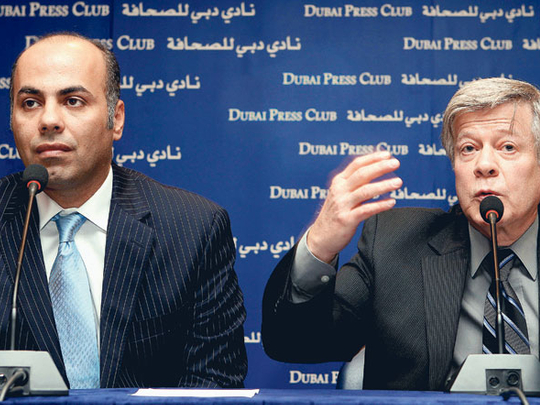
Dubai: If people-to-people diplomacy helped end the Cold War, then it can help bridge the gap of understanding between the Muslim world and the US, organisers of an ambitious project aiming to bring the two groups closer said.
Likening the xenophobic views about Muslims in the US to the "Red Scares" against the Soviet Union in the 1910s and 1950s, the people behind the One World movement say it is time for the people of the Muslim world and the US to break the "iron wall" between them.
The One World 2011 initiative was launched at the Dubai Press Club yesterday by President and Chief Executive Officer Bob Walsh, who had organised the 1990 Goodwill Games along with media magnate Ted Turner.
The first event is expected to take place in Seattle next year on the tenth anniversary of the September 11 terrorist attacks, and more could follow every two years subsequently.
Goodwill Games
Organisers say the initiative is an attempt to replicate the role of the Goodwill Games in bringing an end to the Cold War. They hope to build the bridge through youth exchanges, a medical conference, trade bazaars, arts, cultural and sports events as well as inter-faith conferences.
Asked if Muslims are the new communists to the US, Walsh responded that while few parallels can be drawn between the Cold War and Muslim-US relations today, the people-to-people reconciliation experience during the Cold War can serve as an example for Muslims and Americans today to learn from.
"We grew up living in fear of the Soviet Union, but when I went there with Ted Turner I realised that we had a lot in common," he said.
Muslims, he said, have not been portrayed well in the US.
"There is a lot of fear and sensationalism towards Muslims in some US media and not many people there are educated about the Muslim world," he said.
"I have been involved in a programme that taught underprivileged American children Arabic, and have seen how that has changed them."
"Yes, there are a few people in the Muslim world who want to cause problems, like in the rest of the world, and there are also people in the United States that want to cause problems," he said, adding that the majority want good relations.
Walsh said the movement was a fulfilment of US president Barack Obama's call to reach out to the Muslim world in his Cairo speech last year, and noted that the Obama administration was more welcoming of the programme than the previous Bush administration.
Walsh said support for the initiative from both the Muslim world and the US has been overwhelming.












